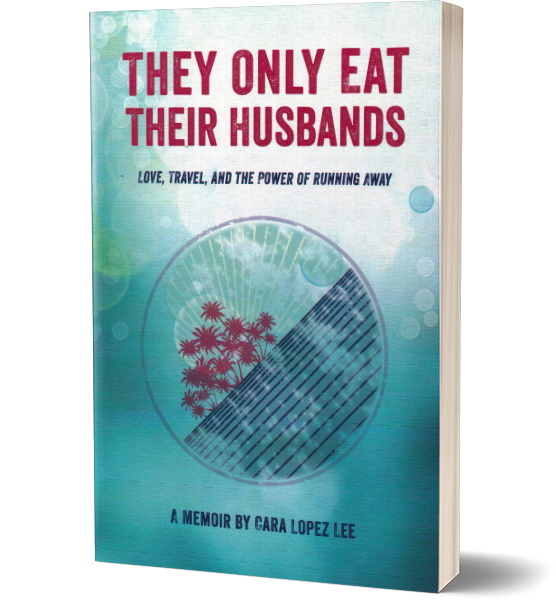I’ve been eager for writer Cat Kurtz to return to Girls Trek Too, to tell us more about her adventure among Buddhist nuns fighting for equal rights in Thailand. Cat Kurtz is the author of My Heart the Sun, a non-fiction account of Theravada nuns and their battle to become bhikkunis, fully ordained monastics. You can read her previous guest post here: My Heart the Sun: A Book Excerpt. After visitors and I read it, we wanted to know what happened next. Cat was kind enough not to say, “You’ll have to wait for the book to find out,” but instead to generously provide one more excerpt! First, she has written a brief set-up, to let us know where we are in the story:

Lee was a nun who threatened the Thai power gender hierarchy, where only men were permitted to wear full ordination orange.
Cat Kurtz: Ajahn Yai Guong Saeng was a fully ordained Buddhist nun living in Bangkok, but unlike my new friend Lee, she did not practice Theravada Buddhism, the national religion of Thailand. Ajahn Yai was Chinese and ordained in Mahayana Buddhism. While Lee was a nun who threatened the Thai power gender hierarchy, where only men were permitted to wear full ordination orange, Ajahn Yai slipped beneath the country’s radar wearing Mahayana grey. This allowed her to build the only temple in Bangkok dedicated to a female deity and run entirely by women. Lee decided that visiting this temple was the best way I could spend my first day in Thailand…
Excerpt #2 from
My Heart the Sun
By Cat Kurtz
©2010
“Do you feel ready to meet the Great Master, Ajahn Yai?” Lee asked.
A month ago I didn’t know there was such a thing as Buddhist nuns. Now I was about to meet the only one in Thailand with a temple.
“How did Ajahn Yai think up this whole project?” I asked.
“This is a good question,” said Lee. “One you should ask the Great Master. When you address her, Cat, you should address her this way. Great Master.”
Our conversation halted to the sound of a slamming trunk. Turning toward the parking structure, we watched a stocky figure in gray walk from her Cadillac, plastic bags dangling from both arms. Aside from the fact that she was bald, she could have been my mother arriving home from the market. Still I held tight to the belief that she was otherworldly, a goddess.
Ajahn Yai bustled toward us, adjusting her square black glasses and widening her smile. Before she could reach the sliding glass door, Lee jumped from our bench and rushed toward her, falling to her knees, and bowing her head to the ground. The swiftness alone caught me off guard. Lee lifted her head from the asphalt to reach into her bag and with raised arms, offer a bunch of bananas. It’d take me ten minutes to unwrap myself from all my camera gear and fall to my knees. I looked for a cue from Ajahn Yai and found her waving with both hands, encouraging Lee to get up. Once Lee obliged, there was mutual bowing, laughing, awkward patting of shoulders. I stood beside the two nuns smiling, and struggling unsuccessfully to untangle myself from the camera straps in time to take a picture.
We removed our shoes before walking inside Ajahn Yai’s private quarters. Unlike the rest of the grounds, this room was small and unremarkable. There was a conference table, a desk, a hotplate and refrigerator, piles of paper, calendars and random knickknacks. It was an office.
Lee explained that Ajahn Yai was Chinese and practiced the Mahayana tradition of her country rather than the national religion, Theravada Buddhism. That meant that her temple, the only temple in Bangkok with a female abbess, was a foreigner’s temple. I was nodding off to the rumble of approaching thunder when the glass door slid open and a sopping wet girl slipped into the room and offered to translate English to Chinese for Ajahn Yai and Chinese to English for Lee.
“How is Jamnien?” Ajahn Yai asked through the girl.
“She is good. She is good,” Lee said. “I sent her home to be with her family in the south before we leave for Sri Lanka. Too much pressure from the press.”
Jamnien was the first maechee in Thailand to seek higher ordination. A fully ordained monk has rights to a free education, room and board at a temple, health care, transportation, plus he earns his family karmic merit. A fully ordained nun is entitled to the same rights. When Lee came to Thailand and saw that there were no other nuns dressed in orange, she asked the novice nuns in white — why not ordain like me? Eight maechees decided to seek ordination, but when the sangha, the most powerful governing body in Thailand, opposed and said it was illegal, seven of the eight backed down. Only Jamnien remained willing. Lee told Jamnien to hide out in her village in the south and wait for me, the American reporter who’d fly her to Sri Lanka beneath her protective wing.
As the birthplace of the bhikkuni line, Sri Lanka was the most sacred, the most legitimized and the closest place for Jamnien to ordain. This was where the bhikkuni lineage began in 250 B.C. when the emperor of India’s daughter performed the first ordination ceremony for the princess and her attendants. In 2002, Thailand regarded Sri Lanka as the sacred host of the Theravada bhikkuni sangha. Just like in Thailand, there was a time when bhikkunis vanished from Sri Lanka. In 1017, invaders from South India attacked the Buddhist capital, Anuradhapura, to destroy the city’s domination of western trade. They annihilated the city. For nearly 750 years there weren’t five monks or five nuns to perform a proper ordination ceremony in Sri Lanka.
Then, in 1753, the Venerable Asarana Sarana Saranankara Maha went on a journey to find an unbroken order to reestablish the line in Sri Lanka. Ironically, he found the line in Thailand. Because he was able to mend the 750-year gap, the bhikkuni sangha flourished in Sri Lanka without interruption.
If Jamnien made it out of Thailand where, as of 2002, Lee was the only fully ordained nun dressed in orange, she would find more than 200 Sri Lankan bhikkunis awaiting her arrival. Once they ordained her, no one in Thailand, or anywhere else, could dispute her monastic legitimacy.
“Jamnien is compassionate and strong,” the girl translated for Ajahn Yai.
“Yes, and her family is there and a temple where the monks will protect her.” Lee fiddled with her shoulder sash and I got the sense that she was worried for Jamnien’s safety.
I watched the storm hurl water at the sliding glass doors and listened to the staccato rhythm of Ajahn Yai’s Chinese until the girl translated. “Jamnien knows many things. She understands what to do.”
Lee pushed her glasses up on her nose. “The other nuns are too afraid to ordain. Only Jamnien will still go to Sri Lanka.” She leaned forward, cupping one hand in another. “Come with us, and perhaps they will find strength.”
If Ajahn Yai flew with us to Sri Lanka, she could take the Theravada vows with Jamnien. If two Sri Lankan nuns returned with them to Thailand, they would compose the five nuns necessary to ordain any maechee in Thailand.
“They should allow women to ordain in Thailand,” said Ajahn Yai.
“What does she mean by ‘they’?” I asked. “Who should allow women to ordain? The Thai sangha? Who’s keeping nuns from ordaining?”
Lee was smiling at Ajahn Yai, but she spoke to me in English. “She’ll support us from here, but she’s not going to make herself a public figure for ordination rites and come with us to Sri Lanka. It’s too dangerous.”
Dangerous? What kind of dangerous? Dangerous like unsafe planes? Like angry mobs? I didn’t even know who would comprise these imaginary mobs, let alone what they’d do to try and stop us.
“Ajahn Yai can’t afford to jeopardize her hospital project,” Lee said. “She has to stay mainstream enough to acquire the funding and support she needs.”
When I turned to look at Ajahn Yai, she was staring back at me and I wondered just how limited her English was.
“Cat,” Lee said, patting my hand, “why don’t you set up your camera and we can make a little film, no? Oh yes. I think this will be very very good. This very positive.”
I didn’t understand why Lee had slipped into Pidgin English. Rather than wonder, I fussed with fistfuls of electronics in the hopes of getting the camera to work. Lee wanted Ajahn Yai to send a message to the world. I had no idea what she envisioned me doing with this tape. Ajahn Yai squared her shoulders. The girl translated from her seat.
“All women are mothers of the Earth. So please do good deeds and love others. And understand forgiveness deeply.”
I had expected something instructive, some to-do list for the international community about how to help women in SE Asia, or a slip of fortune cookie type wisdom. Maybe it was impossible to reach nirvana through someone else. Or maybe enlightenment was as simple as her speech. Be compassionate. Show love. Forgive. There were no secrets to knowing one’s purpose or living well.
“How have you figured out what to do with your life and made such a difference?” I asked. I felt embarrassed but could not help my hope for a healing from a spiritual master.
Before the girl could translate, Ajahn Yai answered me in perfect English. “You think of a good idea,” she said, “and you execute it with dignity.”
I’d spent my first day in Thailand entangled in my cords and concerns, a far cry from dignified, an even further cry from autonomous. Not until she gave me another thumbs up did I realize that my face had freeze-framed into a vacant frown while the camera tape spun forward.
“Sorry,” I said, easing my mouth into a smile and shutting off the camera. “Thank you, Great Master.”
***
 Cat Kurtz has been a witness to this Southeast Asian women’s movement and spiritual revolution since its beginnings in 2002 and still communicates regularly with nuns in Thailand. Her hope is to keep her promise to give voice to their untold story. Cat teaches writing at CU Boulder. Her work has appeared in literary journals such as Seeds of Peace, Eastern Horizons, terrain.org, and Punk Planet. She is an avid adventurer, Write Life Coach and proud new mom.
Cat Kurtz has been a witness to this Southeast Asian women’s movement and spiritual revolution since its beginnings in 2002 and still communicates regularly with nuns in Thailand. Her hope is to keep her promise to give voice to their untold story. Cat teaches writing at CU Boulder. Her work has appeared in literary journals such as Seeds of Peace, Eastern Horizons, terrain.org, and Punk Planet. She is an avid adventurer, Write Life Coach and proud new mom.




